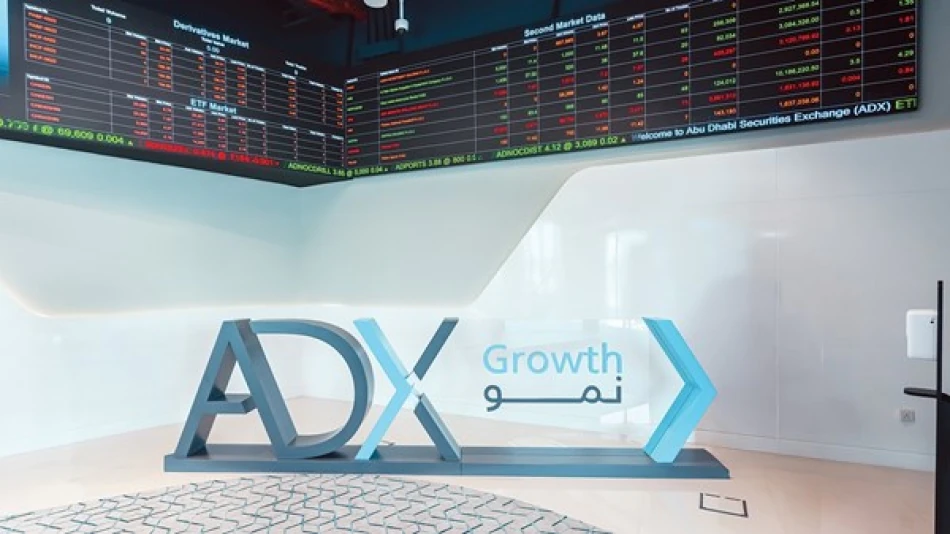
UAE Stocks Surge: Local Equities Gain AED 16.6 Billion in Market Value
UAE Stock Markets Surge AED 16.6 Billion as Interest Rate Cuts Fuel ADNOC Rally
The UAE's stock markets posted impressive gains worth AED 16.6 billion following central bank interest rate cuts, with Abu Dhabi Securities Exchange breaking above 10,100 points for the second consecutive day. ADNOC-listed companies led the charge while foreign investors poured AED 437 million into Abu Dhabi stocks, signaling renewed confidence in the Emirates' energy sector amid a shifting global monetary landscape.
Abu Dhabi Exchange Breaks Key Resistance Level
The Abu Dhabi Securities Exchange (ADX) closed 0.6% higher at 10,099 points, marking a significant technical breakthrough above the psychologically important 10,100 level during intraday trading. The market's AED 16.54 billion gain in market capitalization reflects investor optimism following the UAE Central Bank's decision to cut interest rates in line with Federal Reserve policy.
Trading volume reached AED 1.496 billion across 294.77 million shares through 19,859 transactions. The broad-based rally saw 50 companies advance against 27 decliners, with 46 stocks unchanged—a healthy market breadth that suggests sustainable momentum rather than speculative froth.
ADNOC Companies Drive Market Leadership
Energy giant ADNOC's listed subsidiaries dominated trading activity and price performance. ADNOC Drilling surged 4.44% to AED 5.88, leading by value with AED 223.56 million in transactions. ADNOC Gas topped volume charts with 46.79 million shares traded, while ADNOC Logistics & Services gained 2.49% to AED 5.76.
This energy sector strength mirrors similar trends in Saudi Arabia's Tadawul, where Aramco and related companies have benefited from stable oil prices and increased dividend yields becoming more attractive in a lower interest rate environment.
Foreign Capital Flows Signal Confidence
International investors demonstrated strong conviction, with net purchases of AED 437 million in Abu Dhabi—their largest daily inflow in recent months. Total foreign buying reached AED 805.1 million against sales of AED 368.1 million, indicating institutional appetite for UAE equities.
This foreign interest contrasts sharply with recent outflows from other emerging markets, suggesting the UAE's economic diversification strategy and stable political environment continue attracting global capital. Financial institutions also turned net buyers with AED 67.47 million in purchases, reinforcing the positive sentiment.
Dubai Market Shows Mixed Signals
Dubai Financial Market (DFM) painted a more cautious picture, closing down 0.2% at 5,978.69 points despite briefly touching 6,000 during early trading. The emirate's market added a modest AED 46 million in capitalization, bringing total UAE market gains to nearly AED 16.6 billion.
Emaar Properties gained 1% to AED 13.9, while Emaar Development rose 0.69% to AED 14.4, reflecting continued interest in Dubai's real estate recovery story. However, foreign investors turned net sellers in Dubai with AED 42.77 million in outflows, contrasting with Abu Dhabi's inflows.
Block Trades Indicate Institutional Activity
Large block transactions totaling AED 330.1 million across 23 deals suggest significant institutional repositioning. Aldar Properties saw 19 major transactions worth AED 281.6 million at AED 9.6 per share, potentially indicating strategic investor moves or portfolio rebalancing.
Market Implications and Outlook
The UAE's market performance reflects several converging factors: lower interest rates making dividend-paying stocks more attractive, ADNOC companies benefiting from energy sector stability, and the Emirates' position as a regional safe haven attracting foreign capital.
Unlike previous commodity-driven rallies, this advance shows broader participation across sectors, suggesting sustainable momentum. The technical breakthrough above 10,100 points in Abu Dhabi could target the next resistance level around 10,300, provided energy prices remain stable and global risk appetite continues improving.
For regional investors, the UAE's outperformance versus other Gulf markets reinforces its status as the region's most liquid and internationally accessible market, particularly as geopolitical tensions elsewhere drive flight-to-quality flows toward stable, well-regulated exchanges.
Most Viewed News

 Layla Al Mansoori
Layla Al Mansoori






